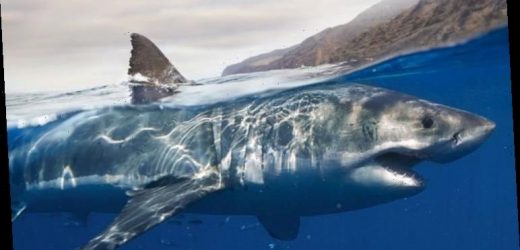Massachusetts: Great white shark attacks seal at harbour
Sharks have gained something of a bad rap in the 20th century, thanks in no small part to their blank stares and jaws lined with razor-sharp teeth but also Hollywood films like Steven Spielberg’s 1975 Jaws. But sharks rarely attack humans, when compared to other natural threats, and fatal attacks are even rarer. According to data compiled by the University of Florida, there were only about 100 reported shark attacks globally in 2019.
You are much likely to be struck by lightning and much more likely to suffer a fatal bicycle injury, at least according to US-based data.
The Florida Museum of Natural History said: “Shark attack is a potential danger that must be acknowledged by anyone that frequents marine waters, but it should be kept in perspective.
“Bees, wasps and snakes are responsible for far more fatalities each year.
“In the United States deaths occur up to 30 more times from lightning strikes per year, than from shark attacks per year.”
Despite the low odds, hundreds of sharks are being killed each year when caught in nets spread along South Africa’s coast.
We will use your email address only for sending you newsletters. Please see our Privacy Notice for details of your data protection rights.
In the KwaZulu-Natal province on the eastern coast of South Africa, nets designed to protect swimmers trap and suffocate at least 400 sharks a year.
About 50 of these sharks are protected species, which include the great white and hammerhead shark.
And sharks are not the only marine animals getting trapped in the nets.
Marine conservationists say sea turtles, whales, dolphins and dugongs all risk getting caught as well.
Walter Bernardis, a seasoned shark diver, said: “They’re a passive system that has been put in the water and everything that puts its head in that net dies.”
The shark expert added: “They’re basically curtains of death.”
At least 37 seven beaches along the province’s coast are lined with safety nets and baited drum lines.
The defensive measures stretch for more than 186 miles (300km) north and south of the province’s capital, Durban.
According to Matt Dickens, head of the KwaZulu-Natal sharks board, 690 animals were caught and released from the nets in 2019.
Although many of them were released alive, the shark expert added 10 times as many are caught by South Africa’s commercial fishing industry.
A study published last year in the journal Marine Policy found some 100 million sharks are being killed by human activity each year.
DON’T MISS…
Shark culling is ‘inefficient nonsense’ – Marine biologist [INTERVIEW]
Shark attacks underwater drone in terrifying footage [VIDEO]
Great white sharks ‘more than likely’ in British waters [REPORT]
California: Great white shark turns ocean red after eating seal
Most of the deaths have been attributed to fishermen catching sharks for their fins and flesh.
Certain Asian countries like China see shark fin soup as a delicacy.
For comparison, sharks only kill about 10 humans each year.
According to the International Shark Attack File (ISAF), the 2014 to 2018 period saw an annual average of 84 shark attacks, with five fatal incidents recorded in 2019.
Great whites are the top of the tables for most attacks, followed by the smaller tiger sharks and bull sharks.
But even great whites have so far only been involved in 333 attacks since ISAF’s records began, of which 52 were fatal and unprovoked.
Tiger sharks, meanwhile, have a recorded 131 attacks and bull sharks have been responsible for 131 attacks.
The Florida Museum of Natural History said: “Many more people are injured and killed on land while driving to and from the beach than by sharks in the water.
“Shark attack trauma is also less common than such beach-related injuries as spinal damage, dehydration, jellyfish and stingray stings and sunburn.
“Indeed, many more sutures are expended on seashell lacerations of the feet than on shark bites!”
Source: Read Full Article






